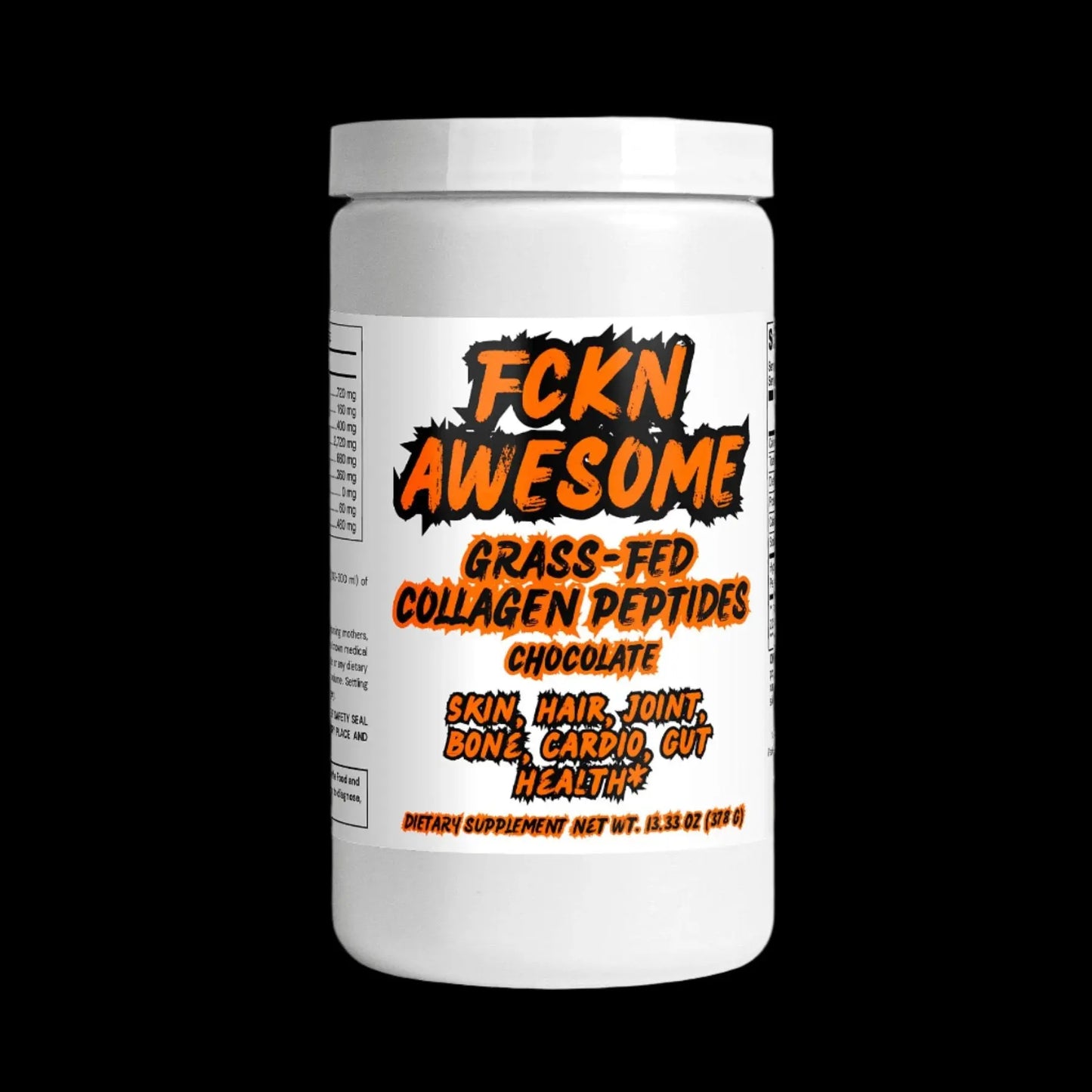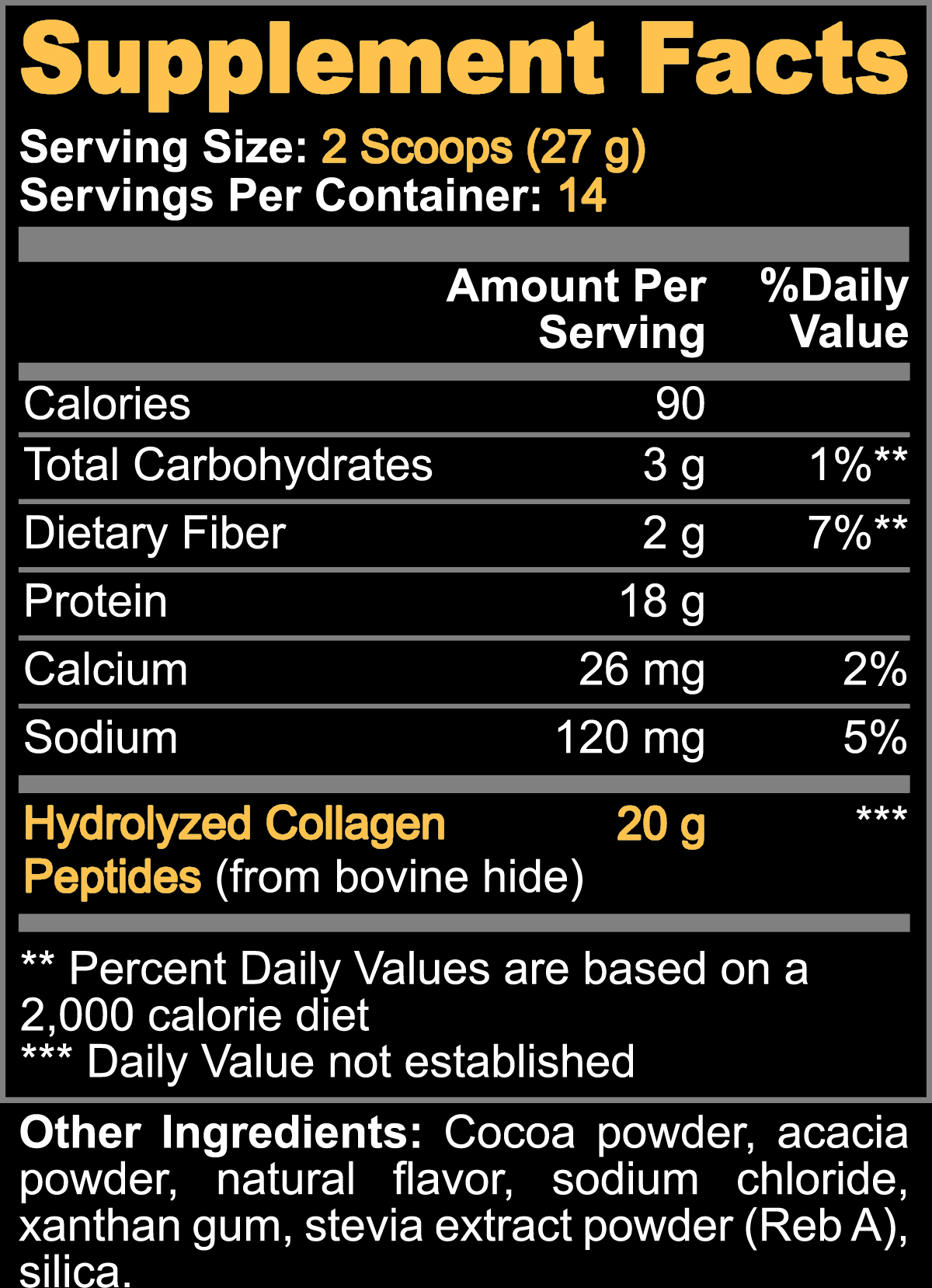
Collagen for 👱Skin, Hair, and Nail Health
Share
When it comes to glowing skin, strong nails, and vibrant hair, collagen is a true powerhouse.
This essential protein plays a vital role in maintaining skin elasticity, hydration, and youth, as well as supporting the health of hair and nails.

Collagen in the Body (adapted from Campos, L. D. et al., 2023)
Backed by numerous clinical studies, collagen supplementation has proven effective in reducing wrinkles, boosting hydration, and even preventing hair loss. Here we’ll explore the science behind collagen’s benefits for skin health, hair vitality, and nail strength.
😍 Skin Health & Youth
The skin is the body’s largest organ.
Collagen, elastin, and hyaluronic acid — are the 3 main components of the skin. They are produced by fibroblast cells in the skin. [1]
Collagen constitutes 80% of the dry weight of human skin. [2]

Structure of young, healthy skin and the effect of aging on its structure (adapted from Campos, L. D. et al., 2023)
Oral collagen supplementation restores collagen, elastin, and hyaluronic acid synthesis by stimulating fibroblast cells and by providing them with building blocks. [3]
- supports the skin's structural integrity,
- improves skin hydration and elasticity,
- reduces the appearance of wrinkles,
- and promotes overall skin health.
Clinical Studies
- A 2020 review of 10 randomized, placebo-controlled human studies has concluded that 10/10 studies have shown improved skin health, such as moisture, elasticity, wrinkle number, and dryness. Studies ranged in duration from 8 weeks to 12 months, with results apparent as soon as 6 weeks, and used doses up to 10 g/day. [4]
- A 2021 review of 19 clinical studies, with a total of 1125 participants aged 20-70 years, has concluded: "...collagen peptides can delay and improve the signs of skin aging by decreasing facial wrinkles and improving skin hydration and elasticity, while the supplementation is maintained. The time required to delay skin aging in most studies was 90 days, and the result was maintained for 4 weeks after the end of supplement administrations... Supplement intake is effective and safe because no adverse effects were reported in any of the analyzed studies..." [5]
- A 2023 systematic review and meta-analysis of 26 randomized controlled trials (RCTs) involving 1721 patients has shown that hydrolyzed collagen supplementation significantly improved skin hydration and elasticity compared to the placebo group. [2] Although several studies exhibited "some concerns" of bias (like the source of funding), the vast majority of studies consistently demonstrated significant improvements in skin parameters (see forest plots below). [2, 6]

Meta-analysis of studies evaluating skin hydration in patients supplemented with hydrolyzed collagen and patients in the placebo group (adapted from Pu, S.-Y. et al., 2023)

Meta-analysis of studies evaluating skin elasticity in patients supplemented with hydrolyzed collagen and patients in the placebo group (adapted from Pu, S.-Y. et al., 2023)
For example, the most recent 2024 randomized double-blind placebo-controlled study of 80 women aged 30 years and older has concluded: "After 6 weeks, participants that received collagen had significant improvements in biometric skin wrinkle parameters from baseline, with a reduction in volume by 46%, in area by 44%, and in depth by 9%, along with a greater increase in skin moisturization (by 34%) than those in the placebo group" [7]

Changes in Skin parameters (on crow’s feet) after 6 weeks of Collagen Peptides intake in healthy women aged 30-65, in the 2024 clinical study (adapted from Carrillo-Norte, J. A. et al., 2024)
🤩 Hair & Nails Health
Cell & Animal Studies
- "...collagen peptides may help to prevent hair loss and maintain healthy hair by preserving epithelial HF stem cells and/or improving the generation of stem cells progenies." [8]
- "...collagen peptides could be used as food supplements and nutraceuticals for hair loss prevention as well as hair regrowth during alopecia." [9]
- "...[Low molecular weight collagen peptide] has the potential to increase hair growth via activating the Wnt/β-catenin signaling pathway." [10]
Clinical Studies
There were 3 human studies regarding collagen effects on hair health [11, 12, 13], and 1 on nails [14]:
- "An oral supplement containing hydrolyzed fish-origin collagen, taurine, cysteine, methionine, iron, and selenium has demonstrated to improve the clinical efficacy of specific anti-hair loss treatments in subjects with androgenic alopecia or telogen effluvium." [11]
- "It was observed after 56 days that therapy with SRC (the mix of 5g Collagen Peptides, vitamins C and E, Hyaluronic Acid, and Biotin), compared to placebo, produced a substantial effect on reduction of wrinkle depth and fine lines by 48.11% and 39%, respectively. There was a 15.69% improvement in skin hydration observed and 28% reduction in hair fall." [12]
- After 12 weeks [hydrolyzed collagen and vitamin C] vs. placebo, skin hydration was increased by 13.8%, R2 elasticity index was increased by 22.7%...an average 11.0% improvement in scalp scaling and a 27.6% increase in the total number of hairs counted vs. placebo. This was associated with a 31.9% increase in clinical grading score for hair healthy appearance." [13]
- "Bioactive collagen peptides treatment promoted an increase of 12% nail growth rate and a decrease of 42% in the frequency of broken nails. Additionally, 64% of participants achieved a global clinical improvement in brittle nails, and 88% of participants experienced an improvement 4 weeks post-treatment." [14]
Conclusion
Collagen supplementation is more than a beauty trend — it’s a science-based approach to achieving healthier skin, stronger nails, and more vibrant hair. By stimulating collagen production and supporting the skin’s structural integrity, collagen peptides can visibly reduce wrinkles, improve hydration, and restore elasticity.
When combined with Vitamin C and Zinc, collagen’s effects are amplified. Whether you’re looking to enhance your natural glow or combat the effects of aging, collagen is a safe and effective addition to your wellness routine.
For maximum results, consider incorporating collagen peptides daily for a minimum of 8 to 12 weeks. Consistency is key, and with time, you will experience noticeable improvements in your skin, hair, and nails — proving that beauty truly starts from within!

























